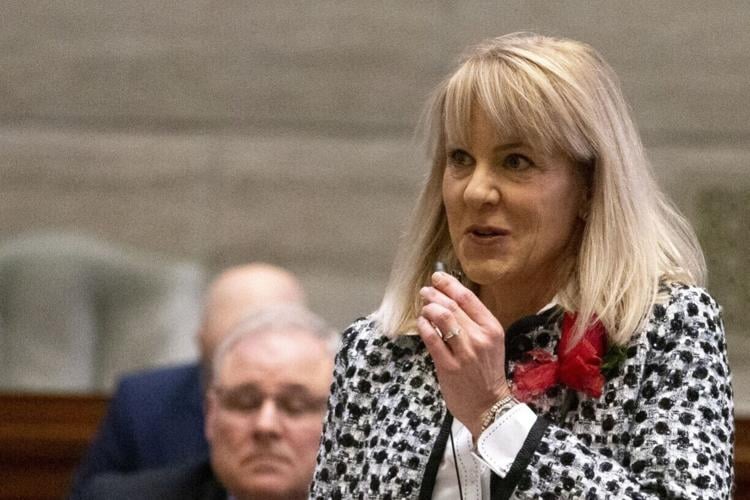JEFFERSON CITY ŌĆö The Legislature has spent the better part of two years discussing policies to lower the property tax burden on senior citizens while allowing a program that helps low-income senior homeowners and renters to languish.
The ŌĆö nicknamed the ŌĆ£circuit breakerŌĆØ ŌĆö provides as much as a $1,100 benefit for homeowners and $750 for renters, but only people with very low incomes can qualify. For example, a married couple filing jointly must have household income of $34,000 or less to take advantage of the credit.
The circuit breaker, which hasnŌĆÖt been updated by lawmakers since 2008, isnŌĆÖt tied to inflation ŌĆö and thatŌĆÖs meant fewer and fewer Missourians are being helped. In 2009, the state provided $119 million in circuit-breaker credits. That dropped to $65 million in fiscal year 2024.
People are also reading…
The Missouri Budget Project, , said only very low-income Missourians ŌĆö those making $14,300 or less a year ŌĆö derive the maximum benefit from the credit. Those near the top of the eligible income range receive as little as $10 from the credit.
Rather than fix the circuit breaker, though, lawmakers focused in 2023 and 2024 on passing and then revising a property tax freeze for homeowners aged 62 and older.
The freeze, however, has been adopted so far in just a handful of counties, in part because the original statute lacked clarity about what taxing authorities were affected and which taxpayers qualified.
ŌĆ£A sixth grader could have written (the law) better,ŌĆØ said Roger Fischer, the former Western District commissioner of Callaway County.
Unlike the freeze, the circuit breaker, which was enacted in 1973, was designed to help low-income Missourians, including elderly and disabled renters.
While seniors on fixed incomes can struggle financially, itŌĆÖs elderly renters who are often most in need. In 2022, homeowners over 65 had almost 50 times more wealth than non-homeowners, according to a . Even when home equity is removed, homeowners are about 22 times wealthier.

Sen. Tracy McCreery, D-911▒¼┴Ž═°, speaks during the opening day of the Missouri legislative session on Wednesday, Jan. 4, 2023, in Jefferson City.
This year, to expand the number of people who can qualify for the circuit breaker, two lawmakers ŌĆö Sens. Tracy McCreery, D-Olivette, and Mike Cierpiot, R-LeeŌĆÖs Summit ŌĆö are sponsoring bills to raise the credit amounts and income thresholds, tying them to the consumer price index in order to blunt the effect of inflation.
Under McCreeryŌĆÖs plan, the maximum allowable credit for renters would climb to $1,055 and for homeowners to $1,550. It also raises the income threshold significantly ŌĆö for example, up to $48,000 for a married couple filing jointly ŌĆö and annually adjusts for inflation.
CierpiotŌĆÖs proposal is less generous but still raises the credit amounts and income thresholds and ties them to inflation.

State Sen. Mike Cierpiot, R-LeeŌĆÖs Summit, right, speaks on the Senate floor on Thursday, May 16, 2024, one day before the end of legislative session.
ŌĆ£(The circuit breaker) is something that truly you just hear a lot about when youŌĆÖre in the community, you know, when you do town halls, or when youŌĆÖre just going door to door,ŌĆØ McCreery said in an interview with the Post-Dispatch.
McCreery also said the circuit breaker is a wise fiscal investment for the state. ŌĆ£ItŌĆÖs much more affordable for the state if people age at home as long as possible,ŌĆØ she said.
Even though the Senate unanimously supported the circuit breaker in 2008, some legislators have said that efforts should be focused on homeowners paying property taxes, not renters who pay those taxes indirectly. Attempts to make renters ineligible for the tax credit have been mounted several times, including in 2019. McCreery said that she opposes excluding renters.
McCreery is hopeful that the effort to update the circuit breaker will gain some traction this year. One of the strident voices against tax credit programs, Freedom Caucus member Bill Eigel, is gone because of term limits. His exit could mean fewer roadblocks for the bill, McCreery said.
Also, adding ammunition to McCreery and CierpoitŌĆÖs efforts, State Auditor Scott Fitzpatrick released a in November highlighting the reduced benefit of the circuit breaker because of the ŌĆ£static financial eligibility thresholds.ŌĆØ
The auditorŌĆÖs report also called out the Department of Revenue for failing to notify eligible residents about the tax credit.
McCreery and CierpiotŌĆÖs bills have been referred to the Senate Economic and Workforce Development Committee.
McCreeryŌĆÖs bill is Senate Bill 64. CierpiotŌĆÖs is SB 101.











